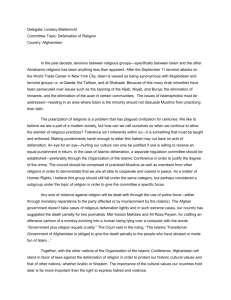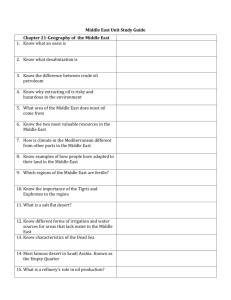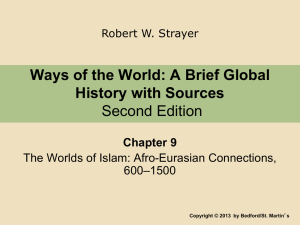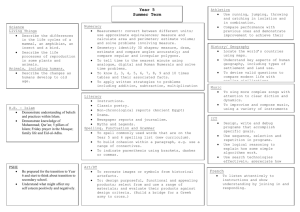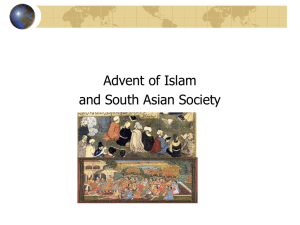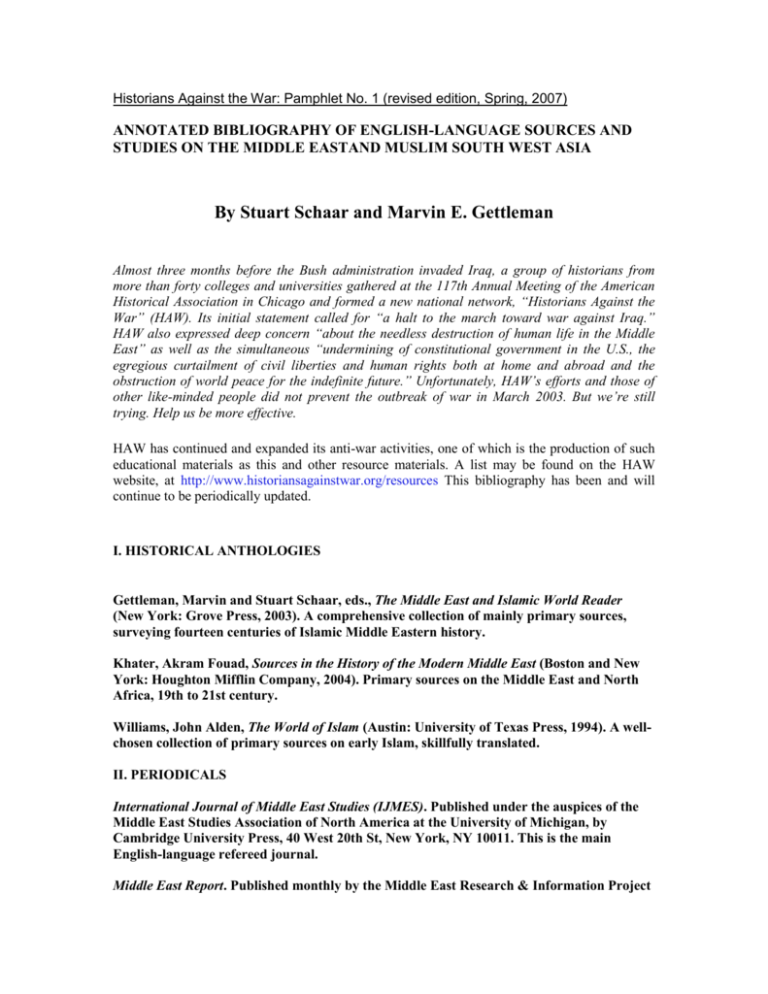
Historians Against the War: Pamphlet No. 1 (revised edition, Spring, 2007)
ANNOTATED BIBLIOGRAPHY OF ENGLISH-LANGUAGE SOURCES AND
STUDIES ON THE MIDDLE EASTAND MUSLIM SOUTH WEST ASIA
By Stuart Schaar and Marvin E. Gettleman
Almost three months before the Bush administration invaded Iraq, a group of historians from
more than forty colleges and universities gathered at the 117th Annual Meeting of the American
Historical Association in Chicago and formed a new national network, “Historians Against the
War” (HAW). Its initial statement called for “a halt to the march toward war against Iraq.”
HAW also expressed deep concern “about the needless destruction of human life in the Middle
East” as well as the simultaneous “undermining of constitutional government in the U.S., the
egregious curtailment of civil liberties and human rights both at home and abroad and the
obstruction of world peace for the indefinite future.” Unfortunately, HAW’s efforts and those of
other like-minded people did not prevent the outbreak of war in March 2003. But we’re still
trying. Help us be more effective.
HAW has continued and expanded its anti-war activities, one of which is the production of such
educational materials as this and other resource materials. A list may be found on the HAW
website, at http://www.historiansagainstwar.org/resources This bibliography has been and will
continue to be periodically updated.
I. HISTORICAL ANTHOLOGIES
Gettleman, Marvin and Stuart Schaar, eds., The Middle East and Islamic World Reader
(New York: Grove Press, 2003). A comprehensive collection of mainly primary sources,
surveying fourteen centuries of Islamic Middle Eastern history.
Khater, Akram Fouad, Sources in the History of the Modern Middle East (Boston and New
York: Houghton Mifflin Company, 2004). Primary sources on the Middle East and North
Africa, 19th to 21st century.
Williams, John Alden, The World of Islam (Austin: University of Texas Press, 1994). A wellchosen collection of primary sources on early Islam, skillfully translated.
II. PERIODICALS
International Journal of Middle East Studies (IJMES). Published under the auspices of the
Middle East Studies Association of North America at the University of Michigan, by
Cambridge University Press, 40 West 20th St, New York, NY 10011. This is the main
English-language refereed journal.
Middle East Report. Published monthly by the Middle East Research & Information Project
2
(MERIP) by Blackwell Publishers, Inc., 350 Main Street, Malden, MA 02148. The best
progressive review of contemporary events in the region. Worth subscribing to at
merip@nb.net
III. GENERAL WORKS ON THE MIDDLE EAST
Andersen, Roy R., Robert F. Seibert, and Jon G. Wagner, Politics and Change in the Middle
East: Sources of Conflict and Accommodation (7th ed., Upper Saddle River NJ: Prentice
Hall, 2003). A textbook that offers one of the best available introductions to the society and
politics of the Middle East. Especially good on refuting crude western stereotypes of Arabs
and Muslims.
Beinin, Joel, Workers and Peasants in the History of the Modern Middle East (Cambridge UK
& New York: Cambridge University Press, 2001). Survey of the roles played by artisans,
factory workers, and agricultural workers in the emergence of the modern Middle East.
Burke, Edmund, III, ed., Struggle and Survival in the Modern Middle East (Berkeley CA:
University of California Press, 1993). One of the modern classics of Middle Eastern social
history, containing biographies of people, some well known and others not so.
Cleveland, William L., A History of the Modern Middle East (2nd ed., Boulder CO:
Westview, 2000). The best English-language textbook on 19th and 20th century Middle
Eastern history.
Egger, Vernon O., A History of the Muslim World to 1405: The Making of a Civilization
(Upper Saddle River NJ: Pearson/Prentice Hall, 2004). Text and primary documents
covering the first eight centuries of Muslim history.
Eickelman, Dale, The Modern Middle East and Central Asia: An Anthropological Approach
(4th ed., Upper Saddle River NJ: Prentice Hall, 2001). Insightful anthropological
introduction.
Fromkin, David, A Peace to End All Peace: The Fall of the Ottoman Empire and the Creation
of the Modern Middle East (New York: Avon Books, 1989). A well-written, although
conventional, diplomatic-military analysis of World War I, British duplicity, and the postwar emergence of Turkey.
Gerner, Deborah J., Understanding the Contemporary Middle East (Boulder, CO: Lynne
Reiner Publishers, 2000). Useful introduction to the region.
Humphreys, R. Stephen, Between Memory and Desire: The Middle East in a Troubled Age
(Berkeley, CA: University of California Press, 1999). One of the best analyses of the
contemporary Middle East, providing a needed corrective to Bernard Lewis’ work (below,
in “Islam” section).
Patai, Raphael, The Arab Mind (1973; new ed., New York: Hatherleigh Press, 2002 ) Cruder
than the Orientalist writings of Bernard Lewis or Samuel Huntington, this book by an
anthropologist is clearly hostile to Islam and Arabs, although it has devoted supporters in
the U.S. armed forces.
3
McCarthy, Justin, The Ottoman Turks: An Introductory History to 1923 (London and New
York: Longman, 1997). Clearly written survey.
Owen, Roger, State, Power and Politics in the Making of the Modern Middle East (2nd ed.,
New York: Routledge, 2000). A sophisticated analysis of the dynamics of the Middle
Eastern state system.
Quartaert, Donald, The Ottoman Empire, 1700-1922 (Cambridge UK & New York:
Cambridge University Press, 2000). A social and economic history of the final three
centuries of the last surviving empire in the region.
Said, Edward, Orientalism (New York: Vintage Books, 1978). A classic work analyzing the
West’s deep-seated misunderstanding of the Islamic world. To be supplemented by Macfie,
Alexander Lyons, ed., Orientalism: A Reader (New York: New York University Press, 2001),
a collection of essays on Orientalism by Said, his supporters, and his critics.
Stivers, William, America’s Confrontation with Revolutionary Change in The Middle East
(New York: St. Martin’s, 1986). The best historical analysis of U.S. policy on the Middle
East.
Yapp, M. E., The Near East Since the First World War: A History to 1995 (2nd ed., New
York: Longman, 1996). A reliable encyclopedic survey.
Yergin, Daniel, The Prize: The Epic Quest for Oil, Money & Power (1991; reissued, New
York: Free Press, 1993). Pulitzer prize–winning historical study of the worldwide oil
industry, seen mainly from the vantage of the oil companies.
III. ISLAM
Al-Azmeh, Aziz, Islams and Modernities (London and New York: Verso, 1996). A
penetrating view into the diversity of Islamic practices and regional differences in the
Muslim world. A good corrective to the essentialized concept of “Islam” current in western
scholarship, and also in popular and journalistic discourse.
Arkoun, Mohammed, Rethinking Islam: Common Questions, translated from the French
and edited by Robert D. Lee (Boulder CO: Westview, 1994). One of the leading
contemporary scholars of Islam presents a stimulating perspective.
Bulliet, Richard W., Islam: The View from the Edge (New York: Columbia University Press,
1995). A Middle Eastern medievalist, Bulliet argues that most Muslims can live without an
Islamic state since their lives revolve around powerful social structures which order their
existence.
Cole, Juan R., Sacred Space and Holy War: The Politics, Culture and History of Shi’ite Islam
(New York: I.B. Tauris, 2002). A masterful study of the subject by a scholar who writes a
valuable periodic blog, "Informed Comment" (www.juancole.com).
Denny, Frederick M., An Introduction to Islam (2d ed., New York: Macmillan, 1994). An
excellent introduction to Islam as a religious system.
Hodgson, Marshall G. S., The Venture of Islam: Conscience and History in a World
4
Civilization (3 vols., Chicago: University of Chicago Press, 1974). Still pertinent after 30
years, this classic study of Islam’s rich diversity places its vast subject within a global
context.
Lewis, Bernard, “Roots of Muslim Rage,” Atlantic Monthly, Sept., 1990. A grim perspective
by a much-touted leading orientalist against whom the late Edward Said sparred for years.
Said’s “Clash of Ignorance,” The Nation, October 22, 2001, is a vigorous polemic against
Lewis and a similarly oriented Samuel Huntington, who wrote on “The Clash of
Civilizations” between the West and the Islamic World. (Both Lewis’ and Said’s pieces are
in Gettleman/Schaar, The Middle East and Islamic World Reader, reading # 36.)
Mamdani, Mahmood, Good Muslim, Bad Muslim: America, the Cold War and the Roots of
Terror (New York: Pantheon, 2004), a wide-ranging examination of the context of modern
Islam and its antagonists.
Ramadan, Tariq, In the Footsteps of the Prophet (New York: Oxford University Press,
2007). This Swiss scholar, unable to obtain a visa to enter the U.S., offers a favorable view of
the Prophet Muhammad in this biography, Its subtext is to show that Islam (but not the
radical fundamentalist version) is compatable with Western democracy.
Schimmel, Annemarie, Islam: An Introduction (Albany NY: State University of New York
Press, 1992). A general survey by a leading authority on Sufism, or mystical Islam.
Watt, Montgomery, Muhammad: Statesman and Prophet (New York: Oxford University
Press, 1990). An abridgment of two earlier books by the eminent author.
IV. WOMEN AND GENDER
Ahmed, Leila, Women and Gender in Islam (New Haven: Yale University Press, 1992). A
scholarly study of women throughout Islamic history.
Gettleman/Schaar, The Middle East and Islamic World Reader, readings #1, 4, 9, 15a and c,
and 33 a and b all deal with women and gender.
Haddad, Yvonne Yazbeck and John L. Esposito, eds., Islam, Gender and Social Change
(London and New York: Oxford University Press, 1997). Shows how Muslim women have
struggled to define gender across North Africa, the Middle East and South Asia.
Kandiyoti, Deniz, ed., Women, Islam & the State (Philadelphia PA: Temple University Press,
1991). Covers Bangladesh, Egypt, India, Iran, Iraq, Lebanon, Pakistan, Turkey, and
Yemen.
Keddie, Nikki R., and Beth Baron, eds., Women in Middle Eastern History: Shifting
Boundaries in Sex and Gender (New Haven CT: Yale University Press, 1991). Important
studies on women and gender.
Meriwether, Margaret L. and Judith Tucker, eds., A Social History of Women and Gender in
the Modern Middle East (Boulder CO: Westview, 1999). Useful collection including
historiographical studies.
Schimmel, Annemarie, My Soul Is a Woman: The Feminine in Islam (New York and
5
London: Continuum, 2003). Through an examination of sacred texts and social customs, the
author explores both Islamic doctrines and feminism.
Tucker, Judith, ed., Arab Women: Old Boundaries New Frontiers (Bloomington and
Indianapolis, IN: Indiana University Press, 1993). Treats gender discourses and roles,
women’s work and politics.
Walther, Wibke, Women in Islam from Medieval to Modern Times, translated from the
German by C. S. Salt (Princeton NJ: Markus Weiner, 1992). Insightful historical survey.
V. THE ARAB WORLD
Baker, Raymond William, Islam Without Fear: Egypt and the New Islamists (Cambridge
MA: Harvard University Press, 2003). This veteran scholar of Egypt examines the varieties
of Muslim conviction along the Nile.
Barakat, Halim, The Arab World: Society, Culture, and State (Berkeley and Los Angeles CA:
University of California Press, 1993). Wide-ranging views of a sociologist and novelist
originally from Syria.
Bushnaq, Inea, ed., Arab Folktales (New York: Pantheon, 1986). Beautifully translated
collection of folk literature, offering much insight into Arab culture.
Crystal, Jill, Oil and Politics in the Gulf: Rulers and Merchants in Kuwait and Qatar
(Cambridge UK and New York: Cambridge University Press, 1995). Fascinating account
about how the Kuwaiti merchants abdicated their political power in return for regular oil
revenues.
Fandy, Mamoun, Saudi Arabia and the Politics of Dissent (New York: St. Martin’s Press,
1999). Description of the sources of instabiity in the oil-rich desert kingdom.
Gendzier, Irene, Notes From the Minefield: United States Intervention in Lebanon and the
Middle East, 1945–1958 (Boulder CO: Westview, 1999). Rich archival research reveals the
larger patterns of U.S. global policy in the post–World War II period.
Hinnebusch, Raymond A., Syria: Revolution From Above (London and New York:
Routledge, 2002). The best view into developments in a country that might be a future U.S.
military target.
Hourani, Albert, A History of the Arab Peoples (Cambridge MA: Belknap Press of Harvard
University Press, 1991). Highly readable political and cultural study, but skimpy on social
history.
Khalidi, Rashid, Lisa Anderson, Muhammad Muslih and Reeva S. Simon, eds., The Origins
of Arab Nationalism (New York: Columbia University Press, 1991). Presents the most up-todate scholarship on this important subject..
Salibi, Kamal, A House of Many Mansions: The History of Lebanon Revisited (Berkeley and
Los Angeles CA: University of California Press, 1988). Still the best history of the country.
6
Sluglett, Marion Farouk- and Peter Sluglett, Iraq since 1958: From Revolution to
Dictatorship (revised, London & New York: I.B. Tauris, 2001). An important, deeply
researched, well-written historical narrative. See also Riva Spector Simon, Iraq Between the
Two World Wars: The Militarist Origins of Tyranny
Weaver, Mary Anne, A Portrait of Egypt: A Journey Through the World of Militant Islam
(revised ed., New York: Farrar, Straus and Giroux, 2000). Vividly written collection of New
Yorker articles.
VI. AFGHANISTAN, IRAN, PAKISTAN, TURKEY
Abrahamian, Ervand, Iran Between Two Revolutions (Princeton NJ.: Princeton University
Press, 1982). Comprehensive analysis of causes of Iranian revolution of 1979 which
ultimately brought Ayatollah Khomeini to power, supplemented by the same author’s
“1953 Coup in Iran,” Science & Society, Summer 2001.
Keddie, Nikki R., Modern Iran: Roots and Results of Revolution (New Haven CT: Yale
University Press, 2003). One of the best histories.
Rashid, Ahmad, Taliban: Militant Islam, Oil and Fundamentalism in Central Asia (New
Haven CT: Yale University Press, 2000). Clearly written, informed analysis of the Taliban’s
rise to power by a distinguished Pakistani journalist, whose Jihad: The Rise of Militant
Islam in Central Asia (Yale University Press, 2002) takes the argument to countries north of
Afghanistan.
Coll, Steve, Ghost Wars (New York: Penguin Books, 2004). A comprehensive account of the
struggle against the Soviet Union in Afghanistan, Osama bin Laden and the 9/11 attacks.
Rubin, Barnett R., The Fragmentation of Afghanistan: State Formation and Collapse in the
International System (2nd ed., New Haven CT: Yale University Press, 2002). Authoritative,
sophisticated study of the background of the 2001–2002 U.S. war in Afghanistan. Rubin’s
more recent appraisal can be found in Afghanistan’s Transition from Turmoil to Normalcy
(Council on Foreign Relations, CSR Report #12, March 2006).
Weaver, Mary Anne, Pakistan: In the Shadow of Jihad and Afghanistan (New York: Farrar,
Straus and Giroux, 2002). An experienced journalist account of one of the main troublespots in the Islamic world.
Ziring, Lawrence, Pakistan: At the Crosscurrent of History (Oxford, UK: One World
Publications, 2004). Good introduction to the country by a seasoned political scientist,
which can be supplemented by Barry Bearak’s “Pakistan: A Journey Through a State of
Disequilibrium,” New York Times Magazine, Dec. 7, 2003.
VII. PALESTINIAN NATIONALISM AND ZIONISM
Alcalay, Ammiel, Memories of our Future:Selected Essays, 1982-1999 (San Francisco CA:
City Lights, 1999). Supplies insight into the intellectual lives of Sephardic Jews and
Palestinian Arabs.
Bickerton, Ian J. and Carla L. Klausner, A Concise History of the Arab-Israeli Conflict (4th
ed., Upper Saddle River NJ: Prentice Hall, 2002). The best introduction to materials on the
7
subject, containing many primary source documents.
Chomsky, Noam, Middle East Illusions (Lanham MD: Rowman and Littlefield, 2003),
update of the eminent linguist’s 1974 Peace in the Middle East, adding new material on the
Arab-Israeli conflict and the U.S. role in it.
Dowty, Alan, Critical Issues in Israeli Society (Westport CT: Praeger, 2004). A sympathetic
but not uncritical interpretation of Israel’s development since statehood by a scholar who
often lives and works in Israel
Enderlin, Charles and Robert D. Hack, eds., Shattered Dreams: The Failure of the Peace
Process in the Middle East, 1995-2002, translated from the French by Susan Fairfield (New
York: Other Press, 2003). Enderlin is a Jerusalem journalist for the French television
network France 2; he and his co-editor have compiled a richly documented account of the
failure of the Oslo peace process.
Geneva Accords, 2003. An unofficial effort by prominent Israeli and Palestinian negotiators
meeting in Geneva, Switzerland to complete the 2001 Taba negotiations for a two-state
solution (the Taba text is in Gettleman/Schaar, The Middle East and Islamic World Reader,
reading #25c while the Geneva text is on the web at www.mideastweb.org/geneva1.htm.
Gerner, Deborah J., One Land, Two People: The Conflict Over Palestine (Boulder, CO:
Westview, 1991). Excellent historical textbook.
Gettleman/Schaar, The Middle East and Islamic World Reader, chapter V, offers a
documented survey of the Palestinian-Zionist conflict, including Herzl’s 1896 Jewish State,
early Arab perceptions of Zionism’s dangers, The Balfour Declaration, documents from the
British mandate, Vladimir Jabotinsky’s “Revisionism,” the creation of Israel, PLO and
Hamas documents, accounts of the first and second intifadas, and statements of Yitzhak
Rabin, Yasser Arafat, and Ariel Sharon.
Hertzberg, Arthur, ed., The Zionist Idea: A Historical Analysis and Reader (New York:
Jewish Publications Society, © 1959, reprint ed., 1997). Major Zionist texts from early
ideologues to David Ben-Gurion.
Judt, Tony, “Israel: An Alternative Future,” The New York Review of Books (October 23,
2003). Rejecting the two-state solution, this NYU scholar explores the possibilities of a binational state in Palestine.
Khalidi, Rashid, Palestinian Identity: The Construction of Modern National Consciousness
(New York: Columbia University Press, 1998). An important scholarly study.
Kimmerling, Baruch, Politicide: Ariel Sharon’s War Against the Palestinians (London &
New York: Verso, 2003). An up-to-date analysis of the Israeli leader’s policies.
Kushner, Tony and Alisa Solomon, Wrestling With Zion: Progressive Jewish-American
Responses to the Israeli-Palestinian Conflict (New York: Grove Press, 2003). A rich selection
of readings exploring Zionism from a perspective rarely heard in the U.S.
Mearshimer, John J., and Stephen Walt, “The Israel Lobby and U.S. Foreign Policy,”
Harvard University, John F. Kennedy School, Working Paper RWP06-011,
8
Published in the London Review of Books, March 23, 2006). This searching study will
appear in book form in the fall of 2007.
Novick, Peter, The Holocaust in American Life (Boston: Houghton Mifflin, 1999). Although
focused mainly on U.S. attitudes, this meticulously researched book also deals with
international and Middle East issues – especially in Part III.
Quandt, William B., Peace Process: American Diplomacy and the Arab-Israeli Conflict Since
1967 (revised ed., Berkeley CA: University of California Press, 2001). An insider’s account
of U.S. efforts to mediate the Arab-Israeli conflict.
Rogin, Eugene and Avi Schlaim, The War for Palestine: Rewriting the History of 1948
(London & New York: Cambridge University Press, 2001). A judicious account that
incorporates recent research on highly controversial issues.
Said, Edward, The Question of Palestine (New York: Times Books, 1979). One of Said’s
earliest and most comprehensive treatments of the issues.
Sayigh, Yazid, Armed Struggle and the Search for State: The Palestinian Nationalist
Movement, 1949-1993 (New York: Oxford University Press, 1999). General survey of the
Palestinian struggle for statehood, with an excellent bibliography.
Segev, Tom, Elvis in Jerusalem: Post-Zionism and the Americanization of Israel (New York:
Metropolitan Books, 2002). A veteran observer examines recent cultural changes in Israel.
VIII. RELIGIOUS RADICALISM
Ayubi, Nazih, Political Islam: Religion and Politics in the Arab World (New York: Routledge,
1991). A highly intelligent and well-informed analysis of Islamic radicalism.
Beinin, Joel and Joe Stork, eds., Political Islam: Essays from Middle East Report (Berkeley,
CA: University of California Press, 1997). Collection of essays from Middle East Report (see
p. 1).
Burke, Jason, Al-Qaeda: Casting a Shadow of Terror (London: I.B. Tauris, 2003). A nuanced
and complex portrait of al-Qaeda and other Islamic extremist groups.
Sprinzak, Ehud, Brother Against Brother: Violence and Extremism in Israeli Politics from
Altalena to the Rabin Assassination (New York: Free Press, 1999). A well-researched study
of right-wing Zionist extremists and of the political aspects of Orthodox Judaism.
IX. 9/11, THE WARS IN AFGHANISTAN AND IRAQ & U.S. POLICIES
9/11, the official U.S. texts: The 9/11 Commission Report (New York: W.W. Norton, 2004)
and The 9/11 Investigations (New York: Public Affairs, 2004), neither of which is definitive.
Bacevich, Andrew J., The New American Militarism: How Americans Are Seduced by War
(New York: Oxford University Press, 2005). An original study of the origins of
the U.S. war in Iraq and the obsessions that drive it. Bacevich’s previous book, American
9
Empire: The Realities and Consequences of U.S. Diplomacy (Cambridge, MA: Harvard
University Press, 2002) ably refutes the views that the U.S. is not an imperialist power.
Chomsky, Noam, Hegemony or Survival: America’s Quest for Global Dominance (New York:
Metropolitan Books, 2003). The eminent linguist’s warnings about the dangers of U.S.
imperial power, further developed in Chomsky’s Failed States: The Abuse of Power and the
Assault on Democracy (New York: Metropolitan Books, 2006).
Clarke, Richard A., Against All Enemies: Inside America’s War on Terror (New York: Free
Press, 2004). The most cogent critique so far by a Washington official in the Bush and
earlier administration with responsibility for anti-terrorism policies, who resigned over
because of what he considered the weakening of the battle against terrorism brought on by
the 2003 U.S. war on Iraq.
Dudziak, Mary L., ed., September 11 in History: A Watershed Moment? (Durham NC: Duke
University Press, 2003). A set of highly nuanced, and diverse answers to the subtitle’s
question by a high-level group of lawyers and historians.
Falk, Richard A., The Great Terror War (Northampton MA: Olive Branch Press, 2002).
Milbank Professor Emeritus of International Law at Princeton University, Falk asks where
the U.S. war on terrorism will take us. See his provocative essay on “Global Patriotism” in
Gettleman/Schaar, Middle East and Islamic World, reading 35c.
Goodman, Amy, and David GoodmanThe Exception to the Rulers: Exposing Oily Politicians,
War Profiteers and the Media Who Love Them (digital publication, 2004). A fiercely
independent analysis of the Bush administration and its journalistic supporters.
Greenwald, Robert, Uncovered (2003). A powerful documentary film revealing the
deceptions and distortions used by the Bush administration to “sell” its Iraq War. Available
through MoveOn.org (www.moveon.org). Michael Moore’s prize-winning 2004
documentary Farenheit 9/11 offers an overall critique of that same administration’s
policies.
Hiro, Dilip, Iraq: In the Eye of the Storm (New York: Thunder’s Mouth Press/Nation Books,
2002). Seasoned reporter and author of 24 books, in this one Hiro explores how twelve years
of U.N. sanctions transformed Iraq, making the Iraqi population totally dependent on the
Baath Party–controlled Iraqi state.
Hersh, Seymour M., Chain of Command (New York: HarperCollins, 2004). The great
journalist who won a Pulitzer Prize for revealing the atrocities at My Lai (Vietnam 1968)
has now unraveled the road from 9/11 to the dirty war the U.S. is fighting in Guantanamo
and Abu Ghraib. His recent essay on “The Iran Plans,” The New Yorker (April 17, 2006)
points to possibly greater dangers in a war against Iran.
Khalidi, Rashid, Resurecting Empire: Western Footprints and America’s Perilous Path in the
Middle East (Boston: Beacon Press, 2004). A critical examination of the impact of U.S.
power on the Middle East.
Leone, Richard C., and Greg Anrig, Jr., eds., The War on our Freedoms: Civil Liberties in an
10
Age of Terrorism (New York: Public Affairs, 2003). An early collection of essays on the Bush
administration’s domestic policies. Things got a lot worse after publication of this book.
Lifton, Robert Jay, Superpower Syndrome: America’s Apocalyptic Confrontation with the
World (New York: Thunder’s Mouth Press/Nation Books, 2003). The eminent psychohistorian, a National Book Award winner, explores two apocalyptic visions—one Islamist,
the other American—caught in a cycle of violence.
Mann, James, Rise of the Vulcans: The History of [George W.] Bush’s War Cabinet (New
York: Viking, 2004). An enlightening discussion of the “neocons” (neo-conservatives) who
shaped much of U.S. Middle East policy after (and even before) 9/11. (For a supplementary
view see Ron Suskind, The One Percent Doctrine and Andrew Bacevich, The New American
Militarism in this bibliography.)
Meyerowitz, Joanne, ed., History and September 11, Special Issue of the Journal of American
History (Sept, 2002). A diverse and often penetrating and insightful set of essays by
American historians, brought out in book form in 2003 by Temple University Press of
Philadelphia PA.
Packer, George, The Assassins Gate: America in Iraq (New York: Farrar, Straus and
Giroux, 2005) A journalist's carefully argued critique of U.S. policy in Iraq, and its dire
consequences. Packer persists in finding possibilities for better outcomes, as in “The Lesson
of Tal Afar,” The New Yorker (April 10, 2006), which are not, or cannot be, sustained.
Purdum, Todd S. and the staff of The New York Times, A Time of Our Choosing: America’s
War in Iraq (New York: Times Books/Henry Holt, 2003). Far from the last word on this
subject, this Times history is far more useful than the triumphalist military account by
Williamson Murray and Robert H. Scales, Jr., The Iraq War (Cambridge MA: Harvard
University Press, 2003).
Ramadan, Tariq, In the Footsteps of the Prophet (New York: Oxford University Press,
2007). The U.S. government refuses to grant a visa to this moderate Swiss scholar whose
favorable biography of the Prophet Muhammad was just published in the U.S. A subtext
of the book is the compatability of Islam (but not its radical fundametalist versions) with
Western democracy.
Ricks, Thomas E., Fiasco: The American Military Adventure in Iraq (New York: Penguin,
2006). At least as well-informed as Packer’s Assassins Gate, this journalist’s account of the
U.S. war in Iraq is more realistic and sober.
Risen, James, State of War: The Secret History of the CIA and the [George W.] Bush
Administration (NewYork: Free Press, 2006). This book by a Pulitzer Prize–winning
national security journalist offers valuable accounts of beneath-the-surface developments in
Afghanistan and Iraq after 2003.
Suskind, Ron,The Price of Loyalty (New York: Simon & Schuster, 2003). A detailed account
of former Treasury Secretary Paul O’Neill’s ordeal inside George W. Bush’s cabinet as the
decision to invade Iraq took shape. Suskind followed with a chilling account of George W.
Bush’s “Faith-based Certainty in Uncertain Times” (shared by his coterie), New York Times
Magazine, October 17, 2004, and then The One Percent Doctrine (New York: Simon &
Schuster, 2006), a glimpse into the mind-set of Dick Cheney and the group of policy-makers
11
who called themselves “the cabal.”
Woodward, Bob, Plan of Attack (New York: Simon & Schuster, 2004). Mainly because of
the interviews with 75 key U.S. participants in the planning and execution of the 2003-2004
American war in Iraq, this insider chronicle is an invaluable source, but tending toward
fawning judgments, as doest Woodward’s later Bush at War (New York: Simon & Schuster,
2003). The same author’s State of Denial (New York: Simon & Schuster, 2006) changes tone
and supplies a scathing exposé of the Bush administration’s untruths and bungling.
*
*
*






